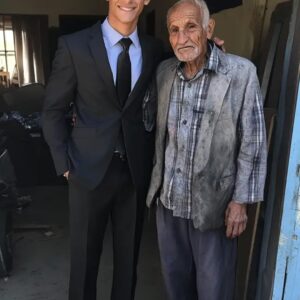Yet, amid this new and overwhelming love, a shadow loomed over our little family’s happiness — my mother-in-law.
From the moment we brought our son home, she stationed herself in our living room, transforming it into her base camp.
Her intentions might have been good, at least that’s what my husband believed, asserting she was here to help us navigate through these early days of parenthood.
However, her presence quickly became another source of stress.
She filled our home with visitors, contributing to the chaos rather than alleviating it.
Despite this, I bit my tongue, choosing silence over confrontation, all for the sake of peace.
Amidst the endless cycle of feeding, changing diapers,
and soothing my son to sleep, I found little time for myself, often going hours without food.
My mother-in-law, claiming that she was there to cook, didn’t extend her support to actually helping with the baby.
Eventually, I was exhausted and hungry, clinging to the hope that at least I wouldn’t have to worry about meals.
Last night shattered that last vestige of appreciation I had for her so-called help. After a long evening spent breastfeeding, I emerged from the nursery, expecting to find a plate saved for me, only to be met with indifference from my husband and outright disregard from his mother. The coldness in her voice as she informed me there was no food left because she assumed I wasn’t hungry cut deeper than any physical hunger I felt. In that moment, my frustration boiled over. The argument that ensued was heated and bitter, revealing the deep fissures in our family dynamics.
My husband’s defense of his mother, coupled with his outrage at my reaction, made it painfully clear that I was alone in this struggle. On top of it all, he even expected me to wash the dishes as well. Feeling utterly unsupported and unseen, I made the decision to leave, seeking refuge in my mother’s home.
The calm and care I found there stood in stark contrast to the turmoil I left behind.Yet, even here, where I thought I would be safe, the conflict followed. My husband’s relentless calls and messages, each more accusatory than the last, painted me as the villain in this scenario.
His inability to understand my perspective, to see the toll his mother’s presence and his lack of support took on me, was disheartening. The narrative he spun to his family, that I was keeping our son from him over a trivial matter like food, only added to my sense of isolation.As I tried to navigate through these swirling emotions, the bond with my son remained my anchor. His innocent dependence on me, his warmth, and his trust, fortified my resolve to seek a better environment for us both, even if it meant standing against the expectations and demands of my husband and his family.In the quiet of my mother’s house, with my son cradled close, I pondered our future.
The path forward seemed daunting, fraught with difficult conversations and decisions. Yet, in the face of this adversity, I knew I had to advocate for myself and my son, to strive for a life filled with the love, respect, and support we deserved.In a moment of sheer desperation, I reached out to the one person I hadn’t considered before — my father-in-law.
Through tear-blurred eyes and with a trembling voice, I poured out my heart, detailing every strain and stress that had pushed me to my limit. To my surprise, he didn’t just offer words of comfort; he took immediate action.Within the hour, we were standing together at my house’s doorstep, his usually gentle demeanor replaced with a stern resolve that I had rarely seen.
He didn’t spare a moment for pleasantries, bypassing me to confront the heart of the turmoil — his son and wife, seated obliviously in front of the TV. The air grew heavy with anticipation as he declared, “This ends now,” a simple yet powerful decree that commanded attention.He turned to my husband first, his voice a mix of disappointment and authority, “You will wash the dishes every night from now on. Your wife needs your support, not your neglect.”
The shock on my husband’s face was palpable, a visible sign that the weight of his father’s words had struck a chord. Then, without missing a beat, he addressed his wife, my mother-in-law, with a clarity and firmness that left no room for negotiation. “And you, it’s time to go home. Your ‘help’ here is doing more harm than good.” The impact of his words on her was immediate; the usually unflappable woman was reduced to a silent, stunned figure, her protests dying before they could even begin.With the air still echoing his pronouncements, my father-in-law turned to me, a softness returning to his gaze, “Now, let’s go get you a proper meal.”
That dinner was a welcome pause in the storm where understanding and compassion filled the gaps worn by weeks of tension. It was a balm to my frayed nerves, a gesture of solidarity that I had sorely missed.Back home, the reality of my father-in-law’s intervention began to take root. My husband, confronted with the undeniable truth of his neglect, took to the dishes — a symbolic act of taking responsibility not just for the cleanliness of our home, but for the well-being of our family. It was a turning point, one that reshaped the dynamics of our household.The changes were gradual but undeniable.
My husband emerged as a more present and supportive partner, actively participating in the care of our son and the myriad tasks that keep a home running smoothly. My mother-in-law’s presence in our home, once a source of constant stress, became a rare and much more welcome occurrence.
Her visits, now infrequent, were no longer invasions but genuine attempts to connect and contribute positively to our family life.This transformation, sparked by the bold yet necessary intervention of my father-in-law, brought about a sense of peace and respect that had been missing. The support I had longed for was finally manifesting, not just in the physical help around the house but in the emotional solidarity that now characterized our family. It was a stark reminder of the power of understanding and the profound impact of taking a stand for what’s right.In the end, the turmoil that had once seemed insurmountable became the catalyst for a deeper connection and appreciation among us all.
My husband’s efforts to amend his ways and my mother-in-law’s adjusted approach to her visits painted a hopeful picture of our future — a future where support, respect, and love were no longer scarce commodities but the foundation of our home. How would you have dealt with this situation? Let us know on Facebook.
Here’s a similar story about a MIL who threw her DIL’s food out. My MIL Threw Away All My Food from the Fridge – I Responded on Her Birthday Living under the same roof with my mother-in-law had always been a test of patience, especially given the cultural chasm that lay between us. But I never anticipated that her disdain for my South Asian heritage would escalate to the point of her disposing of all my cooking supplies, a deliberate act that felt like a direct assault on my identity.
My culinary practices, deeply rooted in my culture, were more than just about sustenance; they were a vibrant thread connecting me to my family, my heritage, and my very sense of self. The food I prepared was a celebration of my lineage, each dish a story of my ancestors, flavored with tradition and memories. So, when I discovered my pantry emptied, it was as if those connections had been callously severed.
This incident was the peak of ongoing tensions. Since my mother-in-law moved in, there had been a noticeable shift in our household dynamics. My husband, caught between his love for the diverse flavors of my cooking and his mother’s criticisms, found himself in an unenviable position of mediator. Despite his best efforts, the harmony we once enjoyed had eroded, leaving in its place a palpable strain that threatened to unravel the fabric of our family.Her criticisms weren’t new to me.
From my eating habits to the aromatic spices that perfumed our home, she spared no opportunity to express her disdain, her comments a constant echo of disapproval. My husband’s attempts to bridge this gap, to explain the richness and beauty of my culture, often fell on deaf ears, his words dissolving into the air, leaving no impact.The day the pantry stood bare, my world tilted.
The realization that she had acted on her contempt by discarding not just the ingredients but a piece of my identity was a profound shock. Her justification, that it was for the sake of her son’s dietary preferences, was a blatant dismissal of my existence, my culture, and the choices of her own son.
Faced with the daunting task of replenishing my supplies amid the challenges posed by the quarantine, I returned home from an unsuccessful attempt at grocery shopping, only to be met with her audacious questioning about dinner. It was a moment of clarity for me; I understood then that silence was no longer an option. Her actions were not just a personal attack but a challenge to my place in this family and to my identity. I was determined to not let her narrative define me.With a newfound resolve, I embarked on a culinary strategy aimed at showcasing my heritage in a manner that was impossible to ignore.
My mother-in-law’s upcoming party presented the perfect opportunity. Instead of the traditional American cuisine she had anticipated, I introduced subtle infusions of Indian flavors into each dish, transforming the menu into a silent but powerful statement of my culture.
The reaction was immediate and unanimous; the guests were enchanted by the unexpected flavors, their compliments a chorus of approval that filled the room. For the first time, my mother-in-law was forced to witness the embrace of my heritage by her own friends, a reality that challenged her prejudices head-on.This breakthrough moment at the party served as a turning point.
The praise from her guests prompted a reluctant reevaluation of her biases, leading to a begrudging acknowledgment of her misplaced animosity. The realization that her resistance was rooted in deeper biases and that her son’s happiness was intertwined with the acceptance of his wife’s culture marked the beginning of a shift in our relationship.Although the journey towards full acceptance and understanding remained fraught with challenges, the decision for my mother-in-law to move out signaled a new chapter for our family. It was a change that brought with it a breath of fresh air, allowing for healing and the promise of a more harmonious future.
The experience, painful as it was, underscored the transformative power of food as a bridge between cultures. It taught us the importance of embracing diversity and the beauty of opening our hearts and homes to the stories and traditions that food can tell, paving the way for acceptance and mutual respect.





